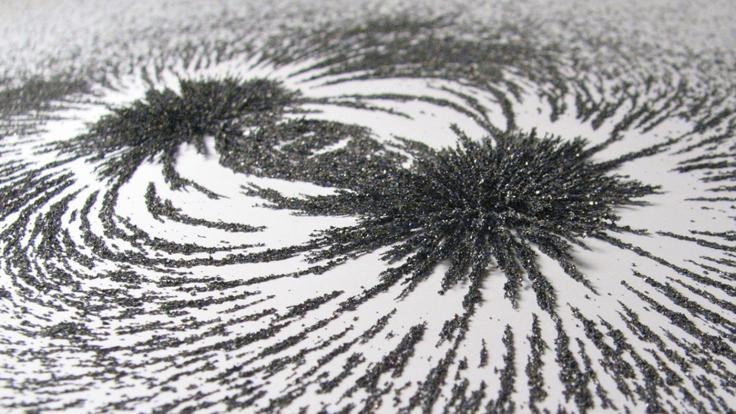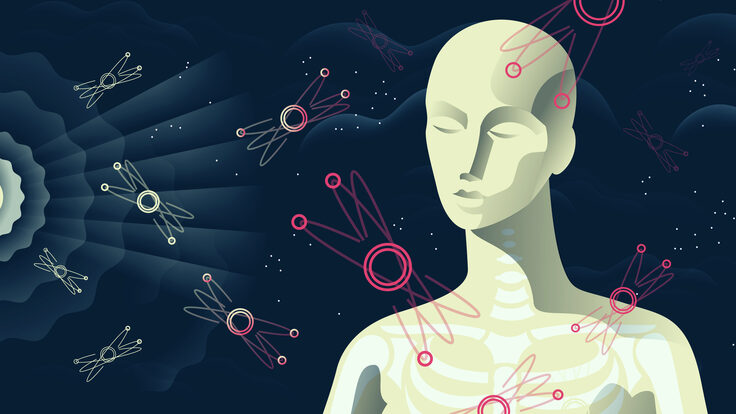John Gilbey tweaks the future
An interview with the author of "Catalyst"
John Gilbey is a writer, photographer, educator, and project manager at Aberystwyth University in Wales. For the past two decades, his fiction and non-fiction stories have appeared in the likes of Nature, New Scientist, and the Guardian.
He wrote the preceding science-fiction story "Catalyst" especially for symmetry, loosely drawn from his visits to the San Francisco Bay Area and SLAC National Accelerator Laboratory in July 2009.
He talks with symmetry about writing, visiting SLAC, experiencing the spirit of Silicon Valley, and remaining an optimist.
By Olga Kuchment
 |
| Photo: Julie Gilbey |
John Gilbey's science-fiction stories often take place in the tangible few decades to come, allowing him to play with scientific ideas while working within the framework of a familiar reality. His first-hand experiences with science and the culture of science inform the stories. As a young scientist he studied grasslands and soils in the cold, damp moorlands of England and Wales. The Welsh climate, he says, pushed him toward the "much more attractive" indoor vocation of computer science.
Q: What was the inspiration for "Catalyst"?
A: I was in California last July, and was doing some articles about the Bay Area. I was lucky enough to get an interview with SLAC Director Persis Drell, and I spent a very, very enjoyable half-day at the center. And as a thank-you to the people who looked after me, I wanted to write a short story.
As to the actual catalyst for "Catalyst": I spend a lot of my time traveling to different research organizations and universities. And when you walk in as an outsider, you always pick up an aura of how the place operates, how the people work together. The simple thingslike what's scribbled on the whiteboards in the labs and the officesgive you a quick picture of how the place fits together. There was something about the feeling in the center that made me think, "These are people that might appreciate a slightly off-beat romance."
Q: How did you decide where to take the story from there?
A: I had to be quite careful because my ignorance of high-energy physics is profound. By setting the story in the future and giving it a set of experiments which were carefully undefined, I felt a bit safer. I tried to plug in my own experiences with lab work and research, pictured against what might happen when you start looking for a reason behind an event. It's the old line from Hamlet: "There are more things in Heaven and Earth, Horatio, than are dreamt of in your philosophy." There may be whole spectra out there that we can't yet see, feel, or measure.
Q: You wrote another story set in the San Francisco Bay Area, published in Nature, and it also mentions the tsunami of 2018.
A: It's not that I'm predicting a tsunami in 2018; I just want to reassure the city of that. It's just something to upset the balance of what you expect.
Q: What happens to "Catalyst's" Bob and Fiona is kind of sad.
A: If I had let them live happily ever after, some analysis would have been possible of the ongoing relationship. Maybe there will be a sequel. I would be interested to hear any feedback you get from the story.
Q: What kind of feedback have you gotten on your other stories?
A: Very varied. Some people like them, some people think they're too flippant. And other people think they can see themselves in the story, which is something I'm always very careful to avoid. The characters are completely synthetic, but the traits they exhibit are not in the least unusual among academics.
Q: What kind of traits?
A: Ooh, now that's a really awkward question. Let's just say that academics and scientists are prone to the same human weaknesses as everybody else.
Q: You've written about the stereotypes of scientists in popular culture, most notably in the June 2008 Times Higher Education article titled "Fools, I will destroy you all!"
A: I was looking at the portrayal of scientists in the media, particularly in film. My concern was that as I talked to people who weren't active in the science community, they were more aware of scientists through fictional portrayals than they were of real scientific characters. For example, if you ask someone who's a famous scientist, you get the reaction, "Dr. Strangelove."
It's always an evil stereotype that people seem to pick. If you Google for an image of "scientist" and look at the first 100 hits, a huge number of them are of a lab-coated crazy person with thick glasses, wild hair, doing something very, very dangerous with flasks of mysterious chemicals. It seemed to me something that's getting ingrained in the culture more and more. It's unfortunate.
What I try to expose through the stories is the humanity of the science community. I try to encourage the view of scientists as being just like everybody else.
Q: What do you think is the real value of science to society?
A: Inestimable. I don't think you can overstate the case for science in digging our way out of the holes we've dug ourselves into as a society.
I'm part of the generation that read Isaac Asimov and Arthur C. Clarke as science-fiction authors. And they were both confident in technological fixes to human situations. That's something that's decreased over time. Doomsday hypotheses have lately been much more about science causing problems rather than science solving them, which I think is a great loss.
Q: What do you say to people who distrust science's ability to dig us out of the holes we've dug for ourselves?
A: Look at the track record. Look at the developments over the last 20 years that have made huge progress in medicine, in agriculture, in improving the human condition. Whether those improvements have been implemented becomes a society issue, a political issue, but the tools are routinely being generated. And how they are managed is going to be more and more important. That's one reason why we should have a scientifically educated population, so people can make their own judgments of how technologies ought to be applied to society.
Q: As we apply these technologies, how do you think the world is going to change?
A: I like to think for the better. But I'm an optimist. If you lose faith in humanity's ability to look forward positively, there is little left for society.
I have a dangerous fascination with California, I have to say. I was in Mountain View last July on a Thursday night, and all the restaurants were open late. There were thousands of people strolling around and a band was playing in the middle of the street. And at one little table there were three or four people in their early 20s huddled around a laptop putting a presentation together. And it was obvious that the next day was their big pitch, their one big shot with this development they were planning. They were completely oblivious to everything around them. That sort of energy just permeates the whole environment. That's absolutely fascinating.
In some parts of Europe there is not that culture. If you talk to people in California and set them a problem, they will grab a few people, sit around the table, and say, "How can we do this?" rather than "Why can't we do this?" It's a mindset that I think is hugely beneficial to society in general and science in particular.
Q: How do you think science will change in our lifetimes?
A: I gave a talk on that with a bunch of science communicators. We were in the lecture theater where Faraday lectured all those years ago. You could feel the ghosts creeping around you.
I was speculating about the process of doing science in 50 years' time. My speculations are that science will become a far more nomadic activity, even more so than it already is. I suspect that more and more, there will be centers like SLAC that can carry out the physical end of research. But more of the research activity will be done virtually. It could be a way for science to get closer to society again. But that's the science-fiction writer in me talking.
Q: How did you become a science-fiction writer?
A: I am not sure I've got an answer to that. I've always read science fiction, since I was very young. It's a way of talking about science in a way where the people you respect know that you're not actually referring to them, that you're talking conceptually.
And of course you can take huge liberties with your source material. You can make any assumptions you like in the future. You can invent a whole raft of technologies and breakthroughs that may well happen, and nobody can actually say, "That's impossible." Because as soon as someone says, "No, no, that's impossible," it'll spring up.
Q: What ideas do you most like to play with, in your stories?
A: By setting stories in the future, I'm trying to allow a scrutiny of possible futures. In many cases, they are futures we may wish to avoid. Exposing them to the light will maybe make people think a little harder on how we go about life.
That sounds terribly grand. All my stories are intended to be humorous on the surface, but they all have a dark hidden message.
Q: How does that mesh with being an optimist?
A: It's much easier to be optimistic if you know that people are thinking about the bad things that could happen. If people are walking off into an unknown future but not thinking about what could go wrong, then it's difficult to be optimistic.
One of my careers has been project management and quality management. These are people who don't like surprises. They want to understand risk and manage it rather than allow things to happen. My science fiction stories are a sort of project management of the future.
John Gilbey can be reached at gilbey@bcs.org.uk
Click here to download the pdf version of this article.






